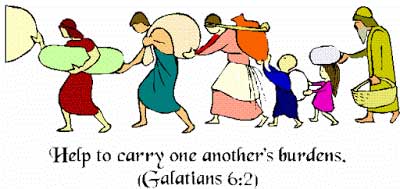Contradictions in Harmony: Burdens re-Born … (08/01/15)
The Bible is literally filled with verses and passages and theological principles that directly contradict one another … Quite a few of them are reconcilable (e.g. the apparent contradictions in the first two chapters of Genesis are easily explained by the “fact” that Genesis describes not one Creation Event in two very different ways, but rather two Creation Events that happened one after the other), many of them are trivial (e.g. it doesn’t really matter how Judas died — Matthew 27:5 vs Acts 1:18), some are attributable to simple scribal error (e.g. 2 Kings 24:8 vs 2 Chronicles 36:9) and a few of them are indeed incredibly significant (e.g. Jesus portrayed as a “God of wrath” in the book of Revelation vs Jesus seen as a gentle representative of a God of “perfect”, unconditional Love & never-ending Forgiveness in the Sermon on the Mount).
There are literally hundreds of these blatant inconsistencies within the Bible’s pages, and most of them fit into one of the first three categories mentioned above, and yet there is another class of conundrum within those ancient manuscripts — namely, the “contradictions” that are not only NOT contradictions, but that also provide us with Great Wisdom once they are clarified … As a prime example, I offer the following from the self-proclaimed apostle Paul: “Carry one another’s burdens, and in this way you will fulfill the law of Christ … For every man shall bear his own burden.” ~ Galatians 6:2 & 6:5
On its face, this passage seems to contradict itself — Are we to carry others’ burdens or carry our own? And if others are already carrying their burdens, what is there left for us to carry?
Well, as is often the case when reading ancient texts — especially those of the Bible — it helps to look to the actual words used when “originally written”* … In the case of Galatians 6:2 & Galatians 6:5, when we look to the ancient Greek used by Paul when writing this letter, two different terms were used for the commonly translated “burdens/burden” found in these two verses. In Galatians 6:2, the Greek word used is “Baros” (Strong’s Concordance #922) — which meant what most of us probably think it means: “weight” or “challenge” or “difficulty” or “problem”. Galatians 6:5, on the other hand, uses the term “Phortion” (Strong’s Concordance #5413) — a term which described the entire cargo contained in a ship’s hold!
As such, aside from the fact that the vast majority of people will almost certainly continue to suffer from their challenges & traumas (providing us all with the opportunity to not only carry our own “burdens” but ease theirs as well), we can now clearly see that there is no contradiction here; that these two verses actually work together to give us a mini-blueprint for living a life of Meaning & Peace. For when we insert the actual terms used in their proper contexts, this passage takes on a very different meaning — one that can bring us great Joy & deep Contentment when put into practice — one that sounds more like this:
“Reach out to others in their times of need — Care for them when they are depressed and assist them when they are weary … For in this way you will fulfill the Calling of LOVE that resides within you.” ~ Galatians 6:2 & 6:5
Amen … Let it be so.
*While the science of textual criticism has indeed advanced enough to reliably recreate a relatively accurate approximation of the Bible’s original contents, not a single “original copy” of ANY of the Bible’s 66 books has been recovered to date.





 ;
;